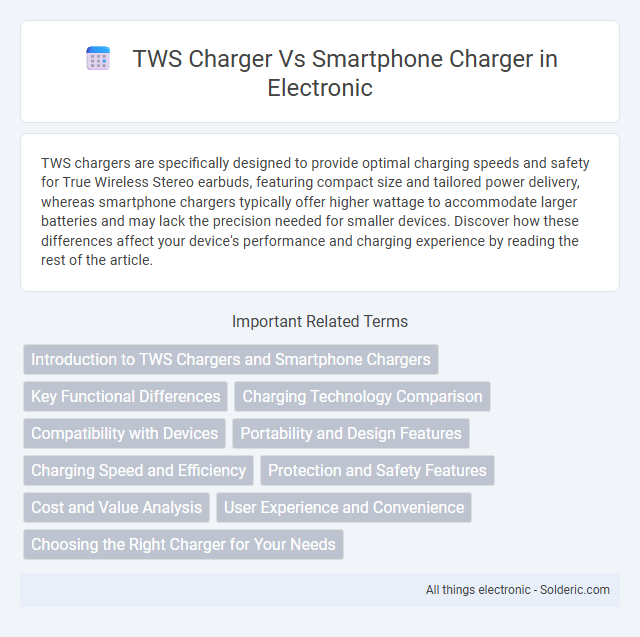TWS chargers are specifically designed to provide optimal charging speeds and safety for True Wireless Stereo earbuds, featuring compact size and tailored power delivery, whereas smartphone chargers typically offer higher wattage to accommodate larger batteries and may lack the precision needed for smaller devices. Discover how these differences affect your device's performance and charging experience by reading the rest of the article.
Comparison Table
| Feature | TWS Charger | Smartphone Charger |
|---|---|---|
| Charging Power | Typically 2W to 5W | Typically 10W to 30W (fast charging up to 120W) |
| Connector Type | Small proprietary or USB-C, wireless | USB-C, Lightning, or Micro-USB |
| Charging Speed | Slow, optimized for small batteries | Fast, supports quick charge technologies |
| Primary Use | Charging TWS earbuds and cases | Charging smartphones and tablets |
| Portability | Highly portable, compact design | Portable but generally larger |
| Power Source | Usually USB port or wireless pad | Wall adapter, USB port, or wireless pad |
| Price Range | Low cost ($5-$20) | Varies widely ($10-$50+) |
Introduction to TWS Chargers and Smartphone Chargers
TWS chargers are specifically designed for true wireless stereo earbuds, offering compact size and tailored charging protocols to ensure fast and efficient power delivery. Smartphone chargers provide higher wattage output to accommodate larger battery capacities, supporting fast charging technologies like USB Power Delivery or Qualcomm Quick Charge. Both charger types utilize USB standards but differ in voltage and current specifications to match their devices' power requirements.
Key Functional Differences
TWS chargers are specifically designed to deliver the optimal power output and charging profile for true wireless earbuds, ensuring faster wireless charging and compatibility with small battery capacities. Smartphone chargers typically provide higher wattage suitable for large battery devices, featuring USB-C or Lightning connectors for wired charging and support for fast-charging protocols like Qualcomm Quick Charge or USB Power Delivery. TWS chargers often incorporate magnetic alignment and wireless charging coils, whereas smartphone chargers focus more on cable efficiency and rapid voltage regulation.
Charging Technology Comparison
TWS chargers utilize wireless inductive charging technology designed for compact charging cases, offering convenience and portability but typically slower power transfer rates compared to smartphone chargers. Smartphone chargers employ wired or fast-charging technologies like USB Power Delivery (PD) or Qualcomm Quick Charge, delivering higher wattage for rapid battery replenishment. The key difference lies in efficiency and power output, with smartphone chargers providing faster, more stable charging suited for larger batteries.
Compatibility with Devices
TWS chargers are specifically designed to support wireless charging for true wireless earbuds and their compact charging cases, often featuring Qi-compatible coils that optimize energy transfer for small batteries. Smartphone chargers, on the other hand, provide higher power output and multiple charging standards, such as USB Power Delivery (PD) or Quick Charge, ensuring compatibility with a wide range of smartphones and tablets. While some smartphone chargers can charge TWS cases via USB connectors, dedicated TWS chargers are limited to earbud devices and may not support direct charging of smartphones.
Portability and Design Features
TWS chargers typically feature ultra-compact designs tailored for lightweight earbuds, prioritizing maximum portability with miniaturized charging cases that fit easily in pockets or small bags. Smartphone chargers often have bulkier builds with larger power bricks and longer cables, designed to accommodate higher wattage and faster charging for bigger batteries. The streamlined, ergonomic design of TWS chargers enhances on-the-go convenience, whereas smartphone chargers balance size with functionality to support diverse charging needs.
Charging Speed and Efficiency
TWS charger and smartphone charger differ significantly in charging speed and efficiency due to their design and power output; TWS chargers typically provide lower wattage optimized for small battery capacities, resulting in slower but energy-efficient charging. Smartphone chargers deliver higher power, often ranging from 15W to 65W or more, enabling rapid charging for larger batteries but consuming more energy during the process. Understanding the voltage and current specifications of each charger is essential to optimize charging performance and prolong battery health.
Protection and Safety Features
TWS chargers often incorporate advanced overcharge protection and temperature control tailored specifically for compact wireless earbuds, ensuring optimal battery health. Smartphone chargers are generally designed with robust safety mechanisms such as short-circuit prevention and voltage regulation to accommodate higher power requirements. When choosing a charger for your device, prioritize models with certified safety standards like UL or CE to safeguard both your gadgets and your well-being.
Cost and Value Analysis
TWS chargers generally cost less than smartphone chargers due to smaller battery capacity and lower power output requirements, offering economical solutions for wireless earbud users. Smartphone chargers provide higher wattage and faster charging speeds, justifying their higher price with enhanced convenience and device compatibility. Evaluating cost against performance, TWS chargers deliver optimal value for compact devices, while smartphone chargers offer greater utility for larger battery demands.
User Experience and Convenience
TWS chargers offer enhanced user experience by enabling cordless, compact charging tailored for earbuds, freeing users from cable clutter compared to traditional smartphone chargers. Smartphone chargers typically require longer charging times and are bulkier, while TWS chargers prioritize portability and ease of use with quick charge support. This convenience allows seamless on-the-go power replenishment, especially for users heavily reliant on wireless audio devices.
Choosing the Right Charger for Your Needs
Choosing the right charger depends on the device specifications and charging habits; a TWS (True Wireless Stereo) charger is optimized for low power, fast charging of earbuds with specific voltage and current tailored to small batteries. Smartphone chargers deliver higher wattage and often support various fast-charging standards like Qualcomm Quick Charge or USB Power Delivery, suitable for larger batteries requiring rapid power delivery. Understanding the power output, compatibility, and charging speed is essential to maximize efficiency and protect device longevity.
TWS charger vs smartphone charger Infographic

 solderic.com
solderic.com